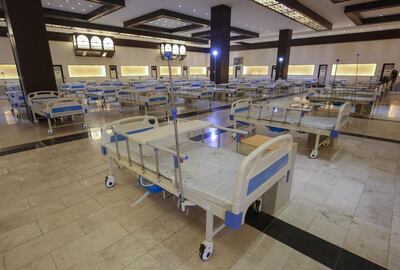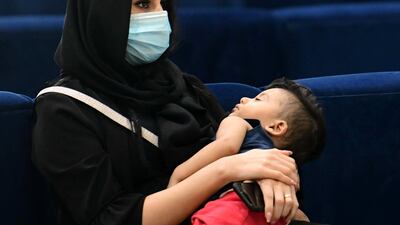The easing of cross-border restrictions between Iraq and Iran could have contributed to the spike of coronavirus cases seen across Iraq, according to health officials.
Panic and unrest have spread across Iraq as health authorities try to contain the spread of Covid-19, with over 53,000 cases and more than 2,000 deaths from the highly contagious respiratory disease.
“We’ve discovered through our assessment that border control has not been strictly managed and certain foot movements have been observed in the eastern governorates between Iran and Iraq,” said Wael Hatahit, emergency co-ordinator for the World Health Organisation's operations in Iraq.
This “may have contributed to the spike that we are seeing”, Mr Hatahit said during an online forum organised by AMAR, a charity that operates across the Middle East.
_______________
Coronavirus in the Middle East
_______________
Iran is the epicentre of the coronavirus outbreak in the Middle East, with more than 230,000 cases and 11,000 deaths.
Iraq closed its border with Iran on March 8 and a week later barred Iraqis living in Iran from returning home.
Iran's leaders have pressured Baghdad to reopen the border as Iraq is a major market for Iranian agricultural products, dairy and construction materials.
In early June, Iraq reopened the Mehran border crossing, which is one of the most significant for both countries because of its proximity to Iraqi cities hosting major Shiite shrines. Nearly 600,000 pilgrims pass through the crossing every year, according to the Iranian news agency Mehr.

“We witnessed after a successful social distancing campaign in March that coronavirus numbers decreased and people were relaxed. Usually when you get that sense of relaxation people tend to socialise more and pay less attention to wearing masks and that’s where it all started,” Mr Hatahit said.
Iraqi officials have repeatedly warned that the health system is on the verge of collapse, with hospitals overwhelmed by patient numbers and running low on medical supplies, including oxygen cylinders.
Since mid-May, Iraq has been recording increasingly higher numbers of coronavirus infections and deaths.
“We are talking about more than 2,000 cases a day. The health system is hardly coping with Covid-19 patients – we need quick, robust intervention and adaptations to the situation,” Mr Hatahit said.
The WHO official said the government should have had plans in place before the rise in cases.
Abdul Aziz Shwan Ahmed, former chief of staff to Iraqi deputy prime minister, said the government was aware of the seriousness of the situation and was doing its best to find a quick solution.
“Iraq has to respond immediately and engage with the international community to control its spread as the Covid-19 crisis cannot wait,” Mr Ahmed said.
He said Iraq did not have the financial means or infrastructure to deal with the crisis.
Public denial of the virus has also played a role in the increase of cases, Mr Ahmed said.
“This is the real problem that Iraq is facing ... tribal and religious leaders should send out clear messages to their followers to adhere to official health policies,” he said.
Officials in Baghdad must allow “the international community to assist it and Iraq has to be more diligent with the way it handles the situation”, Mr Ahmed said.










